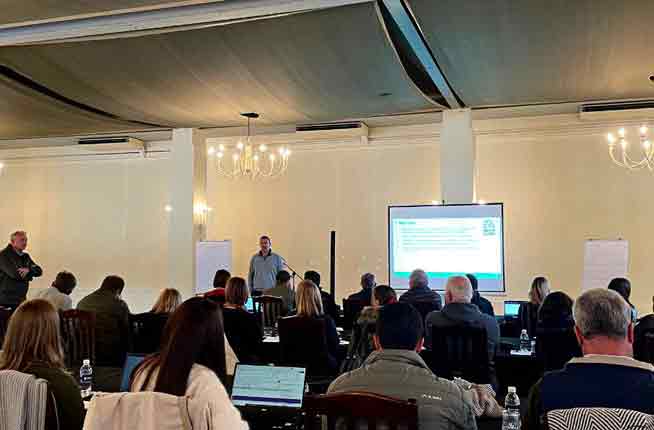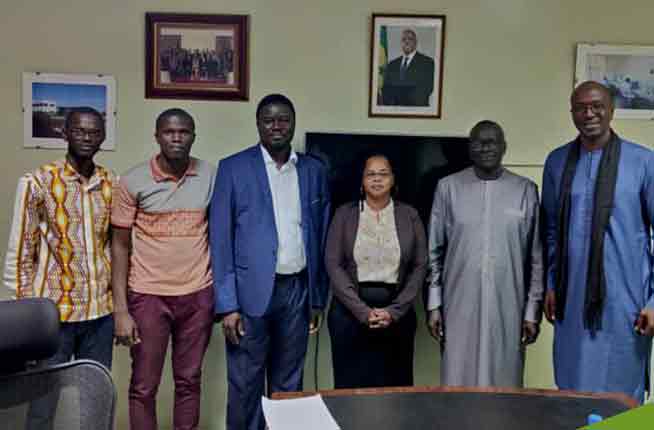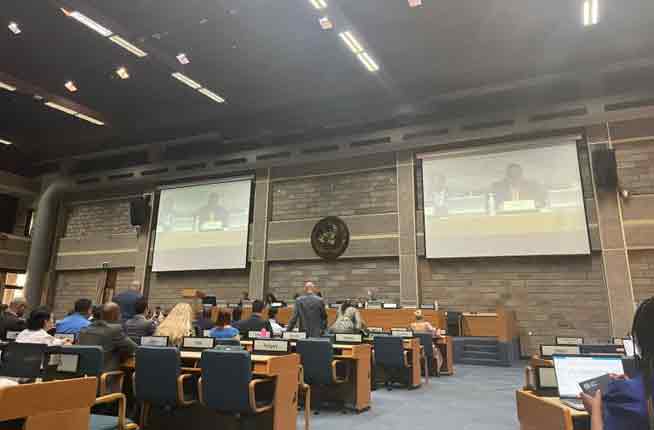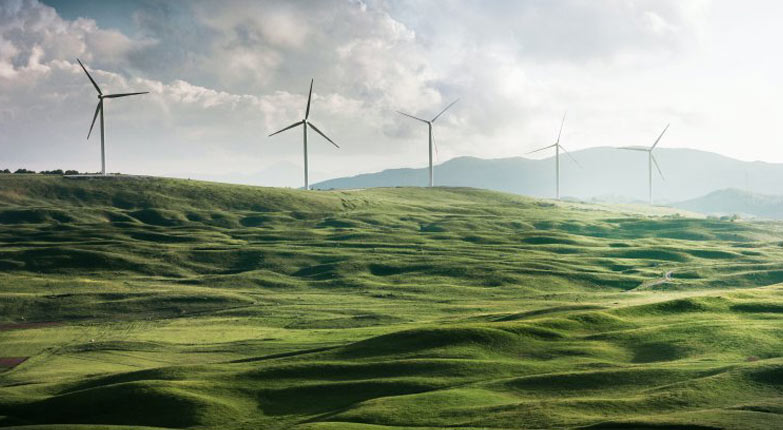From 9th to 11th May, CropLife South Africa supported by CropLife Africa Middle East, hosted a workshop with key stakeholders. The focus? Transitioning towards sustainable food production in South Africa. Engaging regulators and value chain representatives, the discussions showcased a collective commitment to achieving agricultural sustainability. Recognizing the importance of tailoring this transition to the unique characteristics of South Africa’s agricultural landscape, the goal is to ensure food security, facilitate free trade, and uplift farmers’ livelihoods.
CropLife AME visited CropLife Senegal members
Cooperation is the key to the success of Africa. With this in mind, Stella, Regulatory & Stakeholder Relations Director at CropLife AME, and Sylvain, West Central Africa Regional Director at CropLife AME, visited CropLife Senegal members in March to discuss cooperation and revitalization of the national association in Senegal.
CropLife Africa Middle East attended the fourth meeting of the intersessional process in Nairobi
This week, CropLife Africa Middle East attended the fourth meeting of the intersessional process in Nairobi, Kenya. The aim is to discuss recommendations for consideration at ICCM5, which will take place from 25-29 September 2023 in Bonn, Germany, regarding a Strategic Approach and the sound management of chemicals and waste beyond 2020. The ultimate aim is to notably prevent, or where not, minimise, harm of chemicals and waste to protect human health and the environment.
Today marks the final day of the discussions!
CropLife Africa Middle East position on the EU Green Deal
Key points
- CropLife Africa Middle East believes that the African Green Transition agenda needs to be uniquely tailored to, and supportive of, African needs. In agriculture, this requires greater access to high-quality sustainable organic and synthetic inputs and innovation. Technology transfers resulting in more innovation are a key driver of Africa’s Green Transition.
- CropLife Africa Middle East believes that major trading partner green programmes, notably the European Green Deal and Farm to Fork Strategies, should not undermine African countries’ actions and ambitions for inclusive and sustainable growth. There are generational opportunities to support a transition in agriculture across Africa that should not be lost.
- CropLife Africa Middle East believes that the EU’s Green Deal and Farm to Fork Strategy can support Africa’s Green Transition in several ways, by:
- Ensuring timely communication of new requirements;
- Giving African farmers adequate and realistic transition periods;
- Ensuring that EU Mirror clauses are WTO-compatible and science-based;
- Ensuring that EU MRL and IT rules are science-based and changes communicated early;
- Making sure that proposals impacting Africa are based on impact assessments conducted in/for Africa;
- Consulting African partners more closely and regularly.
Green transition in Africa
All 54 African countries signed the Paris Agreement in 2015 and the African Union’s development goals in its Agenda 2063, in 2013. In the last decade much effort has been invested in working towards building green economies across Africa.
Given many African countries reliance on agriculture for both trade and food/feed, this agenda goes far beyond just farmers and the environment. The Green Transition in Africa represents both challenges and opportunities across several areas: economic growth and social progress; sustainable and inclusive development; gender equality and youth empowerment; technology transfer; increased trade and unity within Africa and development and investment opportunities.
African countries contribute 3% of global carbon emissions. They face the most severe impacts of global climate change. Natural disasters like locust infestations, droughts and floods have displaced millions of people and massively disrupted socio-economic structures.
Access to innovations and technologies that can help improve resilience to the impact of climate change as well as helping reduce carbon emissions are needed. Removing barriers to trade in agriculture within Africa can also reduce emission by making it easier for global companies to produce and supply for Africa from within Africa.
The green transition can help fuel sustainable and inclusive growth for Africa. Africa has a large social and economic footprint in the continent and as such, can empower not only farmers, and the value chains that they belong to across Africa, but also the continent as a whole.
Technology can help African farmers deliver more with less and embed sustainable business development that in turn can drive more intra-regional agricultural trade (and decrease dependence on imports and simultaneously reduce CO2 emissions). Unfortunately, these opportunities will be missed if the African Green Transition continues to largely be driven by policies formulated in a different continent based on different realities, most notably by the European Union’s Green Deal and Farm to Fork Strategy.
Eu green deal & the african green transition
The EU and African countries are developing policy measures to combat the effects of climate change. The EU’s vehicle to achieve this is the European Green Deal. Central to this effort
is the ‘Farm to Fork Strategy,’ published in 2020. It aims to reduce the environmental and carbon footprint resulting from food production and consumption. Key measures cover food production, processing, retailing, and waste. The external dimensions of these proposed changes are will shape the African Green Transition in significant ways. The evolving EU policy framework will require African countries to adhere to many new rules stemming from the Green Deal and Farm to Fork strategies.
The socio-economic and environmental impact of policies tailored to European realities is not likely to match reality in other parts of the world where the socio-economic, environmental and agronomic context including soils, climatic conditions and pest pressures are different. Compliance with these new rules, if they do not take African needs into considerations, could become a burden on African businesses and notably African farmers who want to continue accessing the vital EU market.
Many African leaders have expressed concerns that the enactment of the European Green Deal will damage, instead of support, Africa’s Green Transition process. There is a building body of research and data on the impacts that the EU Green Deal could have on Africa – but more is urgently needed.
In the same process technology needs to be viewed as an enabler to achieving a green transition while also considering that the technology needs of different continents are different due to varying agronomic and climatic conditions. Pests like Fall Armyworm, which don’t exist in Europe, may require technologies that Europeans choose not to authorise for use in their domestic market except in exceptional cases.The evolving EU Green Deal and Farm to Fork policies offer opportunities, and challenges, to the African Green Transition.
Four focus areas
1. Uncertainty & compliance costs
Concern: Major policy upheaval, such as those resulting from the EU Farm to Fork Strategy inevitably generate uncertainly, especially in sectors as complex as agri-food chains. Understanding the exact requirements and the associated costs takes time and put business at risk.
Solution: CropLife Africa Middle East asks for additional investments and special emphasis on communicating, in a timely manner, any new requirements as soon they are known. Moreover, African farmers must benefit from adequate and realistic transition periods (at least 24 months).
2. Mirror clauses
Concern: The use of mirror clauses is hotly debated in the EU. Mirror clauses describe when an imported product is produced under the same sanitary, phytosanitary, welfare and environmental standards as products produced within the EU.
Solution: CropLife Africa Middle East calls for mirror clauses to be compatible with WTO rules and based on solid internationally recognised science.
3. Maximum residue limits (mrls) & import tolerances (its)
Concern: Changes to EU MRL and IT policies may negatively impact the African Green Transition. There is grave concern for the potential revocation of import tolerances for any active ingredient not registered in the EU. There is also concern that potential future MRL’s be set with new data points such as environmental factors.
Solution: CropLife Africa Middle East asks that MRL and IT policies be science-based and communicated as early as possible.
4. Support for the african green transition
Concern: African farmers not only require adequate transition periods, but also significant technical and financial assistance to adapt their farming practices. These needs must be supported by stronger advocacy and engagement by African governments.
Solution: CropLife Africa Middle East calls on African governments to do more research on their specific situations and to subsequently build this into advocacy towards trade partners. CropLife Africa Middle East is ready to play its part as a key partner in this process.
Croplife Africa Middle East
CropLife Africa Middle East A.I.S.B.L. is a non-for-profit industry organization representing the leading global manufacturers of pesticides, seeds and biotechnology products in Africa and the Middle East. Together with more than 20 national associations, CropLife Africa Middle East is the voice and advocate for the plant science industry in its region and worldwide.
CropLife Africa Middle East is committed to sustainable agricultural practices and to the responsible use of plant science technologies in the region. We promote the understanding of the benefits of modern plant science solutions. We are convinced that these products and solutions, developed and distributed by our member companies, are indispensable to control weeds.
We believe that the professional and responsible use of these products improve the incomes and livelihoods of farmers and their families and has the potential to contribute decisively to the growth of rural and national economies, as well as promoting food security in the region.
African green transition in agriculture
Key points
- CropLife Africa Middle East supports an African Green Transition that is a vital pathway to not just agricultural development but also socio-economic development, African (and global) trade development and the empowerment of local communities. This transition offers multiple opportunities for Africa to thrive and accelerate the path to achieving the United Nations’ Sustainable Development Goals.
- CropLife Africa Middle East believes that the African Green Transition agenda needs to be uniquely tailored to, and supportive of, African needs. In agriculture this requires greater access to high-quality sustainable organic and synthetic inputs and innovation. Technology transfers resulting in more innovation are a key driver of Africa’s Green Transition.
- CropLife Africa Middle East believes that major trading partner green programmes, notably the European Green Deal and Farm to Fork Strategies, should not undermine African countries’ actions and ambitions for inclusive and sustainable growth. There are generational opportunities to support a transition in agriculture across Africa that should not be lost.
- CropLife Africa Middle East calls on African policy-makers to urgently address the barriers to producing, supplying and trading goods within Africa. These barriers need to be removed as part of the African Continental Free Trade Area to further support the African Green Transition.
- CropLife Africa Middle East supports African countries ongoing work towards an African Green Transition agenda including within the African Union and in talks with the UN and with major partners including the EU.
Green transition in Africa
All 54 African countries signed the Paris Agreement in 2015 and the African Union’s development goals in its Agenda 2063, in 2013. In the last decade much effort has been invested in working towards building green economies across Africa.
Given many African countries reliance on agriculture for both trade and food/feed, this agenda goes far beyond just farmers and the environment. The Green Transition in Africa represents both challenges and opportunities across several areas: economic growth and social progress; sustainable and inclusive development; gender equality and youth empowerment; technology transfer; increased trade and unity within Africa and development and investment opportunities.
African countries contribute 3% of global carbon emissions. They face the most severe impacts of global climate change. Natural disasters like locust infestations, droughts and floods have displaced millions of people and massively disrupted socio-economic structures.
Access to innovations and technologies that can help improve resilience to the impact of climate change as well as helping reduce carbon emissions are needed. Removing barriers to trade in agriculture within Africa can also reduce emission by making it easier for global companies to produce and supply for Africa from within Africa.
The green transition can help fuel sustainable and inclusive growth for Africa. Africa has a large social and economic footprint in the continent and as such, can empower not only farmers, and the value chains that they belong to across Africa, but also the continent as a whole. The African green transition in agriculture needs to consider the following context in Africa:
- It is one of the most food insecure parts of the world.1
- It is home to the world’s second largest rainforest, the Congo Rainforest. Achieving higher yields without that coming at the expense of forest land will require the use of high-quality inputs and good agronomic practices to help increase yields sustainably.
- Most farmers are smallholders and do not use modern technologies.2
- The average farm performs at approximately 40% of its potential.
- Agriculture has a large share in GDP and employment.
- It remains the continent the most impacted by climate change.
Technology can help African farmers deliver more with less and embed sustainable business development that in turn can drive more intra-regional agricultural trade (and decrease dependence on imports and simultaneously reduce CO2 emissions). For these opportunities to be realised, the African Green Transition needs to be driven by policies formulated based on the local context and realities. While a dialogue with global trading partners like the EU is important, the European Union’s Green Deal and Farm to Fork Strategy are formulated for the European continent based on their realities.
Croplife Africa Middle East recommendations
- Improved access to, and use of, yield increasing high-quality technologies must remain a priority so as to enable better use of existing farm land and avoid forest land being used for farming purposes.
- Steps need to be taken to enable the transition towards a circular economy so that plastics used for containers are kept in circulation in the economy for longer, helping cut carbon emissions and helping responsibly manage waste. The plant science industry globally and in Africa Middle East, has developed stewardship initiatives to responsibly manage the full life cycle of products, such as the empty container management programme. This has included recycling empty containers thus helping cut emissions and support the transition towards a circular economy by keeping resources in the economy for longer. Plastic takes 400 years to degrade and only around 11% is recycled. Recycled plastic has around 70% lower carbon footprint than virgin plastic.
- Tackling counterfeit and illegal products must remain a priority. Illicit plant protection products may contain unassessed, unapproved, or poorly manufactured ingredients, with potential to endanger human health and the environment including biodiversity, plus the potential to destroy crops, posing a risk to farmers’ livelihood and food security. As a partner of the Transnational Alliance to Combat Illicit Trade, CropLife remains committed to working with authorities to stamp out counterfeit agrochemicals and pesticides.
- Removal of barriers to trade within Africa would make it easier to produce and supply in Africa from within Africa, hence helping cut the carbon footprint of agricultural inputs. The African Continental Free Trade Area offers potential in this regard. Within the AfCFTA, there is also the potential, for a new protocol on climate and sustainability, to ensure greater alignment between it and the AU’s African Green Stimulus Programme (AGSP) and Green Recovery Action Plan (GRAP), which includes the concept of “resilient agriculture” and already seek to support climate finance.3
Croplife Africa Middle East
CropLife Africa Middle East A.I.S.B.L. is a non-for-profit industry organization representing the leading global manufacturers of pesticides, seeds and biotechnology products in Africa and the Middle East. Together with more than 20 national associations, CropLife Africa Middle East is the voice and advocate for the plant science industry in its region and worldwide.
CropLife Africa Middle East is committed to sustainable agricultural practices and to the responsible use of plant science technologies in the region. We promote the understanding of the benefits of modern plant science solutions. We are convinced that these products and solutions, developed and distributed by our member companies, are indispensable to control weeds.
We believe that the professional and responsible use of these products improve the incomes and livelihoods of farmers and their families and has the potential to contribute decisively to the growth of rural and national economies, as well as promoting food security in the region.





